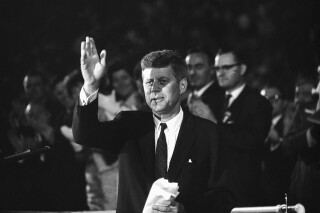Today in History: July 13, John F. Kennedy wins the Democratic presidential nomination

FILE - In this July 15, 1960, file photo, Sen. John F. Kennedy waves to the 65,000 persons who gathered in the Los Angeles Coliseum to hear him accept the Democratic nomination for U.S. President. The Olympic torch at Los Angeles Memorial Coliseum was lit Wednesday, July 15, 2020, to mark the 60th anniversary of John F. Kennedy’s acceptance of the Democratic Party nomination for president at the historic stadium. Kennedy delivered what became known as “The New Frontier” speech on July 15, 1960, during the Democratic National Convention. The Coliseum hosted the 1932 and 1984 Olympics and Los Angeles is scheduled to hold a third Olympics in 2028. (AP Photo/File)
Today’s Highlight in History:
On July 13, 1960, John F. Kennedy won the Democratic presidential nomination on the first ballot at his party’s convention in Los Angeles.
On this date:
In 1863, deadly rioting against the Civil War military draft erupted in New York City. (The insurrection was put down three days later.)
In 1923, a sign consisting of 50-foot-tall letters spelling out “HOLLYWOODLAND” was dedicated in the Hollywood Hills to promote a subdivision (the last four letters were removed in 1949).
In 1960, John F. Kennedy won the Democratic presidential nomination on the first ballot at his party’s convention in Los Angeles.
In 1965, President Lyndon B. Johnson nominated Thurgood Marshall to be U.S. Solicitor General; Marshall became the first Black jurist appointed to the post. (Two years later, Johnson nominated Marshall to the U.S. Supreme Court.)
In 1973, former presidential aide Alexander P. Butterfield revealed to Senate Watergate Committee staff members the existence of President Richard Nixon’s secret White House taping system. (Butterfield’s public revelation came three days later.)
In 1974, the Senate Watergate Committee proposed sweeping reforms in an effort to prevent another Watergate scandal.
In 1985, “Live Aid,” an international rock concert in London, Philadelphia, Moscow and Sydney, took place to raise money for Africa’s starving people.
In 1999, Angel Maturino Resendiz (ahn-HEHL’ mah-tyoo-REE’-noh reh-SEHN’-deez), suspected of being the “Railroad Killer,” surrendered in El Paso, Texas. (Resendiz was executed in 2006.)
In 2006, Israel imposed a naval blockade against Lebanon and blasted the Beirut airport and army air bases; Hezbollah fired dozens of rockets into Israel.
In 2011, California became the first state in the nation to add lessons about gays and lesbians to social studies classes in public schools under a measure signed by Gov. Jerry Brown.
In 2012: His credibility under attack, Republican presidential hopeful Mitt Romney insisted he had “no role whatsoever in the management” of Bain Capital, a private equity firm, after early 1999, and demanded that President Barack Obama apologize for campaign aides who persisted in alleging otherwise. Movie producer Richard Zanuck, 77, died in Beverly Hills, California.
In 2013: A jury in Sanford, Florida, cleared neighborhood watch volunteer George Zimmerman of all charges in the shooting of Trayvon Martin, the Black teenager whose killing unleashed furious debate over racial profiling, self-defense and equal justice.
In 2016, Theresa May entered No. 10 Downing Street as Britain’s new prime minister following a bittersweet exit by David Cameron, who resigned after voters rejected his appeal to stay in the European Union.
In 2017: A federal judge in Hawaii weakened President Donald Trump’s travel ban by vastly expanding the list of U.S. family relationships that visitors from six Muslim-majority countries could use to get into the country. Trump defended his son’s meeting with a Russian lawyer during the presidential campaign, characterizing it as standard campaign practice. China’s most prominent political prisoner, Nobel Peace Prize winner and human rights campaigner Liu Xiaobo (lee-OO’ show-BOH’) died in prison of liver cancer at the age of 61.
In 2020, Washington’s NFL franchise dropped the “Redskins” name and Indian head logo amid pressure from sponsors; the move followed decades of criticism that the name and logo were offensive to Native Americans. (As new names were considered, the team would be known as the Washington Football Team; the team was eventually renamed the Commanders.)
In 2021: The government reported that prices paid by U.S. consumers in June had posted the sharpest 12-month spike in 13 years, as a swift rebound in spending ran up against widespread supply shortages. Los Angeles Angels pitching and hitting star Shohei Ohtani unleashed his 100 mph heat while pitching a perfect inning for the win as the American League beat the National League 5-2 for its eighth straight victory in the All-Star Game; Ohtani went 0-for-2 at the plate. “The Crown” tied with “The Mandalorian” for the most Emmy nominations, 24 each, but the Marvel universe also got bragging rights with runner-up “WandaVision”; the nominations reinforced the rapid rise of streaming, as the top-nominated scripted shows were on services that had largely emerged in the preceding two years.
In 2022: President Joe Biden, opening his first trip to the Middle East, offered anxious Israeli leaders strong reassurances of his determination to stop Iran’s growing nuclear program, saying he’d be willing to use force “as a last resort.” A former CIA software engineer accused of causing the biggest theft of classified information in the agency’s history was convicted at a New York City retrial. A judge rejected a request from actress Amber Heard to set aside the $10 million judgment awarded against her in favor of her ex-husband, Johnny Depp.
